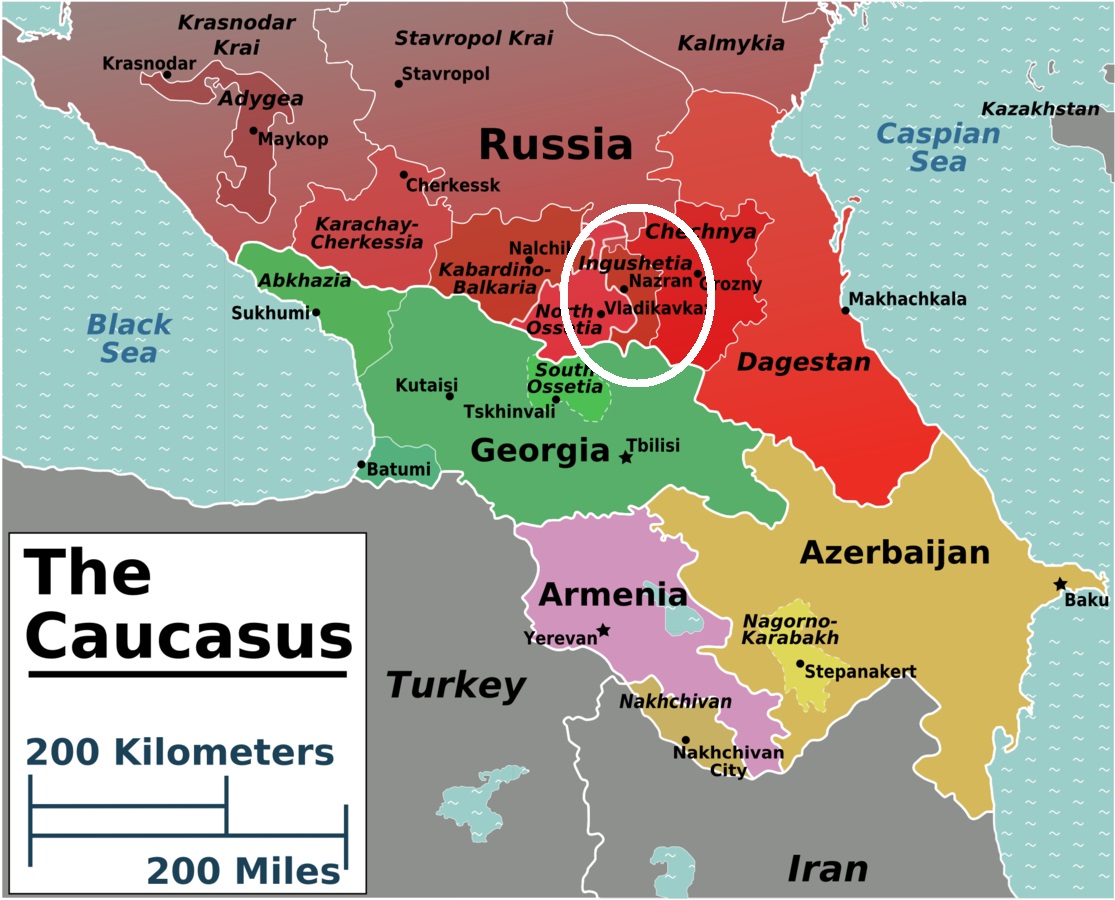All the Word has the privilege of working with a Russian computational linguist named Aleksandr Migunov. Aleksandr is a polyglot, reading 20 languages to varying degrees. In 2004 he learned that he had Chechen ancestors, so he started learning Chechen and several other Caucasian languages. In 2010 he found a Chechen New Testament on a website for the Institute for Bible Translation (IBT), one of the major Bible translation organizations in Russia. God led him to work for IBT as an exegete for the Ingush, Chechen, and Avar translation projects. During the pandemic, the translation work stopped, so he took several courses in software engineering. He's now combining his skills and working with All the Word to develop a lexicon and grammar for Ingush. He hopes to translate the entire Bible into Ingush.
This picture shows Ingush towers that were built in or before the 18th century.
The Ingush people are one of many ethnic groups in the Caucasus. Their homeland, Ingushetia, is a part of Russia. According to the Russian census of 2021, there are 517,000 Ingush people living in Russia, and 473,000 of them live in Ingushetia. It is estimated that the total number of Ingush people in the world is around 1 million, including around 200k Ingush people who live in Europe.
The Ingush language is very close to the Chechen language. These two languages are not mutually intelligible, but many Ingush people, especially people of older generations, are able to understand Chechen because until 1992, Chechnya and Ingushetia were one entity and the Chechen language dominated in Checheno-Ingushetia.
The Ingush language has a very complex grammar, which surpasses even the complexity of the closely related Chechen language. American linguist Johanna Nichols, who studied Ingush, Chechen, and other languages, wrote in her book “Ingush Grammar”: “In 2007 I began a cross-linguistic survey of complexity across several domains of grammar (phonology, morphology, lexicon) using grammatical features already present in available databases and a genealogically based sample of languages including Ingush, my long-term field language. To my surprise, Ingush turned out to be the most complex language of my sample, besting even polysynthetic languages like Seneca, Lakhota, and Halkomelem. Ingush is not polysynthetic; its complexity is due to large inventories of elements (phonemes, cases, tenses, etc.), a high degree of inflectional synthesis in the verb, and classification of various types – declension and conjugation classes, agreement genders, overt inherent genders, split verbal lexicon, split alignment, etc.”
The Ingush people never had a monarchy. Their society has been democratic and egalitarian. Ingush people highly value their freedom. Stalin could not tolerate that, and, at his order on February 23, 1944, all Ingush people were accused of being “enemies” and deported from their homeland to Kazakhstan and Kyrgyzstan. Their books were burned, and their other valuables were destroyed. Many Ingush people died during the deportation due to starvation, cold, and diseases. Many people were also killed during that time. It was an attempt by Stalin to completely destroy the Ingush people. It was forbidden even to mention them or their language in literature. But Stalin’s attempt to destroy the Ingush people failed. In 1957, Khrushchev allowed them to return to their homeland, and most Ingush people did. These days February 23 is a mourning day in Ingushetia in remembrance of the deportation. But every year February 16-25 are official days of celebrating the Ingush language and literature. During these holidays, there are many events in Ingush schools, libraries, institutes, and also on Ingush television and radio. The purpose of these holidays is to stir up interest in the Ingush language and literature, especially among the younger generations.
Practically all Ingush people are Muslims, but it was not always so. In the 8th to 12th centuries, Georgian missionaries preached in Ingushetia. However, Christianity did not become widespread in Ingushetia and eventually almost disappeared. In the 19th century, the Ingush people converted to Islam, and now almost all Ingush people are Sunni Muslims.
The first attempt to translate the Bible was made in the beginning of the 1820s by a Presbyterian missionary from Scotland named George Blyth. He lived in Ingushetia and learned the Ingush language. At that time, most Ingushes believed that there is one God, but they were neither Muslims nor Christians. Chechen Muslims tried to convert Ingushes to Islam and built a mosque for them. But the Ingushes were not interested in Islam and did not need that mosque. So they gave it to Blyth so that he could live in it. He had a good relationship with the Ingush people and preached the gospel among them. Some of them received Christ through him. He also translated the Lord’s Prayer into Ingush and had it published. He was planning to continue translating the Bible into Ingush, but Russian authorities forced him to leave Ingushetia because they wanted the Ingushes to be converted to Orthodox Christianity. But the Ingushes refused, and about 40 years later, they became Muslims.



